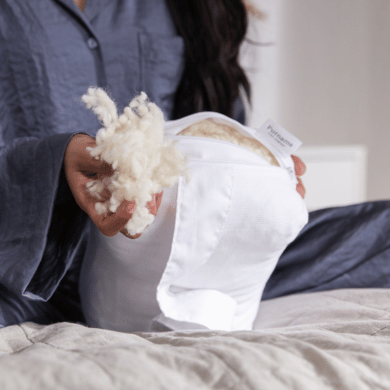
Dévoilement de remèdes naturels contre l'insomnie pour des nuits reposantes
Se retourner sans cesse dans son lit au rythme du tic-tac de l'horloge est un combat universel pour ceux qui souffrent d'insomnie .
Dans notre quête de nuits reposantes et de réveils énergiques, nombreux sont ceux qui se heurtent au problème persistant de l'insomnie. On peut souvent se sentir seul face à ce trouble, mais il est étonnamment fréquent : environ un tiers des adultes britanniques en souffrent.
Ce trouble du sommeil fréquent se caractérise par des difficultés d'endormissement, des réveils fréquents pendant la nuit, un réveil trop précoce et une sensation de ne pas être reposé au réveil.
Les répercussions de l'insomnie vont bien au-delà de la simple gêne nocturne et se manifestent par ;
- fatigue diurne
- irritabilité
- difficulté à se concentrer
- mauvaise mémoire
- somnolence excessive
Comprendre les causes et reconnaître les signes de l'insomnie sont des premières étapes cruciales pour résoudre ce problème.
Forts de ces connaissances, explorons douze remèdes naturels destinés à favoriser un sommeil réparateur. Ces stratégies visent à instaurer des habitudes et un environnement propices à un repos de qualité, sans recourir aux médicaments.
Remèdes naturels contre l'insomnie :
1. Établir une routine du coucher
La constance est essentielle.
Un rituel apaisant avant le coucher peut signaler à votre corps qu'il est temps de se détendre. Pensez à intégrer la lecture, un bain chaud ou quelques étirements doux à votre routine.
Évitez les stimulations excessives, car c'est l'occasion de vous détendre après les événements de la journée.
2. Créer un environnement propice au sommeil
Votre chambre devrait être un havre de paix propice au sommeil. Les conseils en matière d'hygiène du sommeil mettent toujours l'accent avant tout sur l'environnement.
Assurez-vous que la chambre soit calme, sombre et à une température agréable. Investissez dans un matelas et des oreillers de qualité pour un sommeil réparateur.
Réfléchissez à votre environnement et à son influence sur votre sommeil tout au long de la nuit. Anticipez les difficultés en planifiant et en trouvant des solutions.
3. Limiter l'exposition aux appareils électroniques
La lumière bleue émise par les écrans peut perturber votre cycle de sommeil naturel. Essayez de vous déconnecter des appareils électroniques au moins une heure avant de vous coucher. Préférez lire un livre ou écouter de la musique apaisante.
C’est le moment idéal pour introduire quelques pratiques de pleine conscience afin de conditionner votre corps, et il est temps de se reposer et de se ressourcer.
4. Évitez la caféine et l'alcool à l'approche du coucher.
Ces deux substances peuvent perturber le sommeil. Le NHS recommande de s'abstenir de toute consommation six heures avant le coucher.
Privilégiez plutôt une tisane ou du lait chaud. Évitez également les repas copieux trop près de l'heure du coucher ; cela réduira les risques de reflux acide ou d'autres troubles du sommeil.
5. Pratiquez des techniques de relaxation
La respiration profonde, la méditation ou le yoga doux peuvent apaiser votre esprit et préparer votre corps au sommeil. Découvrez notre méthode de sommeil militaire , la méthode 10-3-2-1-0 et bien sûr l'art de la méditation nocturne (notre préférée).
6. Faites de l'exercice régulièrement
L'activité physique favorise un meilleur sommeil, mais le moment choisi est important.
Évitez les exercices physiques intenses juste avant le coucher, car ils peuvent vous dynamiser au lieu de vous détendre. Comme pour la plupart des aspects liés au sommeil, essayez d'instaurer une routine afin que votre corps sache à quoi s'attendre et puisse s'y adapter.
7. Évitez de faire la sieste pendant la journée.
Bien que tentantes, les longues siestes peuvent rendre l'endormissement plus difficile le soir. Si nécessaire, limitez-les à 20-30 minutes en début de journée.
N'oubliez pas que vaincre l'insomnie est un processus long et que de petits changements peuvent mener à des améliorations considérables. En réévaluant vos habitudes de sieste et en intégrant des produits favorisant le sommeil et le bien-être, vous posez les bases d'un avenir rempli de sommeil réparateur.
8. Utiliser l' aromathérapie
Les senteurs apaisantes comme la lavande peuvent améliorer la qualité du sommeil. Pensez à utiliser un diffuseur ou un spray d'oreiller parfumé dans votre chambre.
-
Diffuseurs
-
Sprays pour oreillers
-
Application topique
La lavande, en particulier, a fait l'objet de nombreuses recherches et est reconnue pour sa capacité à réduire l'anxiété, à procurer une sensation de calme et à favoriser un sommeil réparateur.
Intégrer l'aromathérapie à votre rituel du coucher peut être une méthode simple mais efficace pour améliorer votre environnement de sommeil, le rendant plus propice au repos et à la détente.
9. Essayez les remèdes à base de plantes
La tisane de camomille et la racine de valériane sont appréciées pour leurs propriétés favorisant le sommeil.
Il existe d'autres options à base de plantes, telles que :
- Mélisse officinale
- Tryptophane
- Kava
- Cerise d'hiver ou ashwagandha
- Écorce de magnolia
Toutefois, consultez un professionnel de la santé avant d'entreprendre tout traitement à base de plantes.
10. Utilisez du bruit blanc ou de la musique apaisante.
Les bruits de fond peuvent masquer les bruits perturbateurs et créer une atmosphère relaxante propice au sommeil.
Il ne s'agit pas seulement de bloquer les bruits perturbateurs de la nuit ; il s'agit de créer un paysage sonore qui guide votre esprit loin des pensées incessantes et vers un état de repos paisible.
11. Adoptez un horaire de sommeil régulier.
Se coucher et se réveiller à la même heure chaque jour contribue à réguler l'horloge biologique interne, améliorant ainsi la qualité du sommeil.
Cette discipline est cruciale et constitue l'un des fondements de toutes les autres pratiques de TCC-I - maîtrisez-la et vous êtes assuré de passer une nuit de sommeil vraiment réparatrice !
12. Envisagez des compléments alimentaires naturels
Outre les options médicales que le médecin généraliste pourrait prescrire, il existe également des compléments alimentaires plus naturels dont il pourrait être question.
- Mélatonine - « l'hormone du sommeil »
- Magnésium – un moment de calme naturel pour l’esprit et le corps
- L-théanine - acide aminé présent dans les feuilles de thé vert et noir et les champignons
- Passiflore - Stimulant GABA pour améliorer le sommeil et réduire l'anxiété
Consultez toujours un professionnel de la santé avant d'ajouter des compléments alimentaires à votre routine.
Pour lutter naturellement contre l'insomnie, il faut de la patience et de la constance.
En intégrant ces remèdes à votre mode de vie, vous faites des pas positifs vers les nuits reposantes que vous méritez.
N'oubliez pas que, si l'insomnie persiste, il est important de consulter un professionnel de la santé afin d'exclure toute pathologie sous-jacente et d'explorer d'autres options de traitement. À de meilleurs sommeils et à des jours plus radieux !
N'oubliez pas : il est important de consulter votre médecin généraliste si aucun des remèdes naturels ne fonctionne et que l'insomnie persiste et perturbe votre routine quotidienne.
Fais de beaux rêves.


















Laissez un commentaire